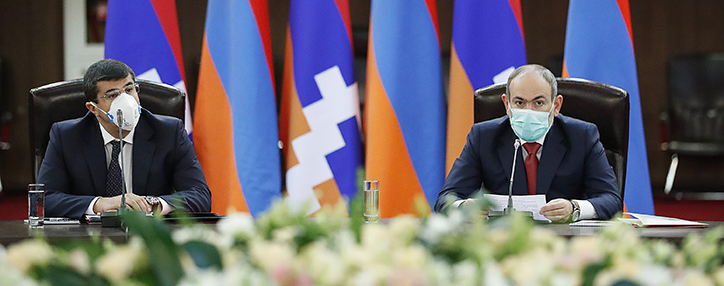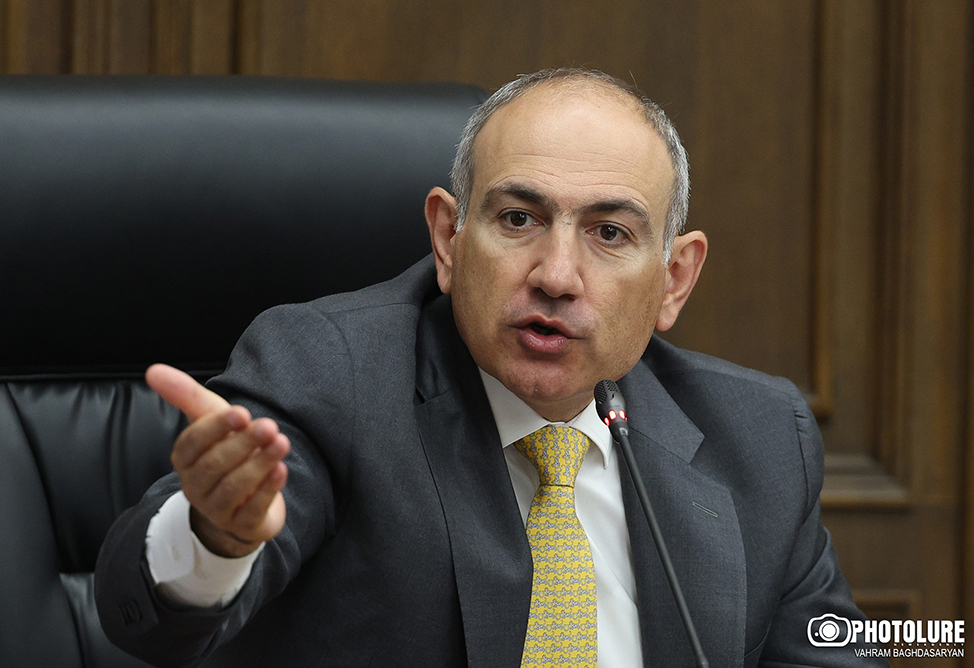Artsakh and Armenia have same approaches to achieving peace and preparing for war, Artsakh president says
19.06.2020,
16:29
Artsakh (Nagorno-Karabakh) and Armenia have the same approaches towards achieving peace and preparing for war in the Karabakh conflict settlement, Artsakh President Araik Harutyunyan stated today when speaking at the joint meeting of the Security Councils of Armenia and Artsakh in Yerevan.

YEREVAN, June 19. /ARKA/. Artsakh (Nagorno-Karabakh) and Armenia have the same approaches towards achieving peace and preparing for war in the Karabakh conflict settlement, Artsakh President Araik Harutyunyan stated today when speaking at the joint meeting of the Security Councils of Armenia and Artsakh in Yerevan.
He said the joint meeting of the Security Councils was an important platform for combining approaches and efforts, exchanging views on ways to solve the security problems facing the united homeland and the Armenian people.
"The first achievements of this kind of work are already noticeable, and I am sure that over time such achievements will grow, increasing the level of our security," Harutyunyan said.
He expressed confidence that only with the effective coordination of state authorities and the collective efforts of society will it be possible to confront the existing challenges.
Artsakh President stressed that in the fight against the invisible threat of coronavirus, vigilance should not be weakened, especially with regard to the visible danger that emanates from Azerbaijan.
For decades, the Azerbaijani authorities have posed a threat to the existence of not only Artsakh, but the entire population of Armenia. Supporting an exclusively peaceful settlement of the Azerbaijani-Karabakh conflict, we are at the same time forced to be ready for war every day. Being an integral part of a single homeland and a unified security system, Artsakh and Armenia fully share approaches and efforts to achieve peace and prepare for war,” Harutyunyan said.
According to him, this implies joint efforts to increase military potential, develop socio-economic opportunities, use a wide range of foreign policy tools to properly protect the rights and interests of the Armenian people and guarantee appropriate information and psychological security.
He said one of the main foundations of the security system is food and energy security, where the achievements are significant, but it is always necessary to continue work, along with new challenges and goals.
“Our task is to ensure as much as possible the self-sufficiency and flexibility of the food and energy system for any situation, in order to guarantee the strength and stability of military and socio-economic security. In this and a number of other aspects, the infrastructure is of strategic importance, and I am glad that we are already starting the construction of the third highway connecting Artsakh with Armenia,” Harutyunyan said.
The Nagorno-Karabakh conflict erupted into armed clashes after the collapse of the Soviet Union in the early 1990s as the predominantly Armenian-populated enclave of Azerbaijan sought to secede from Azerbaijan and declared its independence backed by a successful referendum.
On May 12, 1994, the Bishkek cease-fire agreement put an end to the military operations. A truce was brokered by Russia in 1994, although no permanent peace agreement has been signed. Since then, Nagorno-Karabakh and several adjacent regions have been under the control of Armenian forces of Karabakh. Nagorno-Karabakh is the longest-running post-Soviet era conflict and has continued to simmer despite the relative peace of the past two decades, with snipers causing tens of deaths a year.
In the early hours of April 2, 2016 Azerbaijan, in gross violation of the agreements launched a large-scale offensive along the entire Line of Contact between the armed forces of the Nagorno-Karabakh Republic and Azerbaijan, using heavy weaponry, artillery and combat aircraft. Only thanks to the decisive actions of the Defense Army, which gave a fitting rebuff, on April 5, Azerbaijan was forced to ask, as in 1994, through the mediation of the Russian Federation for the cessation of the hostilities. It has been generally maintained, despite the recurrent violations by the Azerbaijani side. -0-
He said the joint meeting of the Security Councils was an important platform for combining approaches and efforts, exchanging views on ways to solve the security problems facing the united homeland and the Armenian people.
"The first achievements of this kind of work are already noticeable, and I am sure that over time such achievements will grow, increasing the level of our security," Harutyunyan said.
He expressed confidence that only with the effective coordination of state authorities and the collective efforts of society will it be possible to confront the existing challenges.
Artsakh President stressed that in the fight against the invisible threat of coronavirus, vigilance should not be weakened, especially with regard to the visible danger that emanates from Azerbaijan.
For decades, the Azerbaijani authorities have posed a threat to the existence of not only Artsakh, but the entire population of Armenia. Supporting an exclusively peaceful settlement of the Azerbaijani-Karabakh conflict, we are at the same time forced to be ready for war every day. Being an integral part of a single homeland and a unified security system, Artsakh and Armenia fully share approaches and efforts to achieve peace and prepare for war,” Harutyunyan said.
According to him, this implies joint efforts to increase military potential, develop socio-economic opportunities, use a wide range of foreign policy tools to properly protect the rights and interests of the Armenian people and guarantee appropriate information and psychological security.
He said one of the main foundations of the security system is food and energy security, where the achievements are significant, but it is always necessary to continue work, along with new challenges and goals.
“Our task is to ensure as much as possible the self-sufficiency and flexibility of the food and energy system for any situation, in order to guarantee the strength and stability of military and socio-economic security. In this and a number of other aspects, the infrastructure is of strategic importance, and I am glad that we are already starting the construction of the third highway connecting Artsakh with Armenia,” Harutyunyan said.
The Nagorno-Karabakh conflict erupted into armed clashes after the collapse of the Soviet Union in the early 1990s as the predominantly Armenian-populated enclave of Azerbaijan sought to secede from Azerbaijan and declared its independence backed by a successful referendum.
On May 12, 1994, the Bishkek cease-fire agreement put an end to the military operations. A truce was brokered by Russia in 1994, although no permanent peace agreement has been signed. Since then, Nagorno-Karabakh and several adjacent regions have been under the control of Armenian forces of Karabakh. Nagorno-Karabakh is the longest-running post-Soviet era conflict and has continued to simmer despite the relative peace of the past two decades, with snipers causing tens of deaths a year.
In the early hours of April 2, 2016 Azerbaijan, in gross violation of the agreements launched a large-scale offensive along the entire Line of Contact between the armed forces of the Nagorno-Karabakh Republic and Azerbaijan, using heavy weaponry, artillery and combat aircraft. Only thanks to the decisive actions of the Defense Army, which gave a fitting rebuff, on April 5, Azerbaijan was forced to ask, as in 1994, through the mediation of the Russian Federation for the cessation of the hostilities. It has been generally maintained, despite the recurrent violations by the Azerbaijani side. -0-



